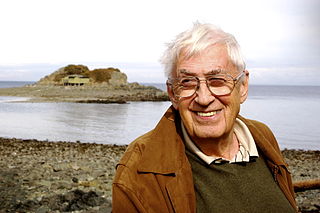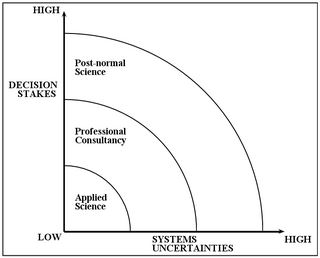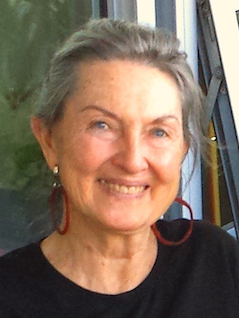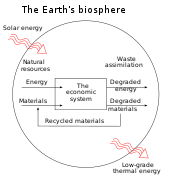
Human ecology is an interdisciplinary and transdisciplinary study of the relationship between humans and their natural, social, and built environments. The philosophy and study of human ecology has a diffuse history with advancements in ecology, geography, sociology, psychology, anthropology, zoology, epidemiology, public health, and home economics, among others.

Ecological economics, bioeconomics, ecolonomy, eco-economics, or ecol-econ is both a transdisciplinary and an interdisciplinary field of academic research addressing the interdependence and coevolution of human economies and natural ecosystems, both intertemporally and spatially. By treating the economy as a subsystem of Earth's larger ecosystem, and by emphasizing the preservation of natural capital, the field of ecological economics is differentiated from environmental economics, which is the mainstream economic analysis of the environment. One survey of German economists found that ecological and environmental economics are different schools of economic thought, with ecological economists emphasizing strong sustainability and rejecting the proposition that physical (human-made) capital can substitute for natural capital.

Crawford Stanley "Buzz" Holling, was a Canadian ecologist, and Emeritus Eminent Scholar and Professor in Ecological Sciences at the University of Florida. Holling was one of the conceptual founders of ecological economics.

Post-normal science (PNS) was developed in the 1990s by Silvio Funtowicz and Jerome R. Ravetz. It is a problem-solving strategy appropriate when "facts [are] uncertain, values in dispute, stakes high and decisions urgent", conditions often present in policy-relevant research. In those situations, PNS recommends suspending temporarily the traditional scientific ideal of truth, concentrating on quality as assessed by internal and extended peer communities.
Transdisciplinarity connotes a research strategy that crosses many disciplinary boundaries to create a holistic approach. It applies to research efforts focused on problems that cross the boundaries of two or more disciplines, such as research on effective information systems for biomedical research, and can refer to concepts or methods that were originally developed by one discipline, but are now used by several others, such as ethnography, a field research method originally developed in anthropology but now widely used by other disciplines. The Belmont Forum elaborated that a transdisciplinary approach is enabling inputs and scoping across scientific and non-scientific stakeholder communities and facilitating a systemic way of addressing a challenge. This includes initiatives that support the capacity building required for the successful transdisciplinary formulation and implementation of research actions.

Systems ecology is an interdisciplinary field of ecology, a subset of Earth system science, that takes a holistic approach to the study of ecological systems, especially ecosystems. Systems ecology can be seen as an application of general systems theory to ecology. Central to the systems ecology approach is the idea that an ecosystem is a complex system exhibiting emergent properties. Systems ecology focuses on interactions and transactions within and between biological and ecological systems, and is especially concerned with the way the functioning of ecosystems can be influenced by human interventions. It uses and extends concepts from thermodynamics and develops other macroscopic descriptions of complex systems.
Daniel Stokols is Research Professor and Chancellor's Professor Emeritus of Social Ecology in the Departments of Psychology and Social Behavior and Planning, Policy, and Design, and founding dean of the School of Social Ecology at the University of California, Irvine. He also holds appointments in Public Health, Epidemiology, and Nursing Science at UCI. His recent research has examined factors that influence the success of transdisciplinary research and training programs. Additional areas of Stokols' research include the design and evaluation of community and work site health promotion programs, the health and behavioral impacts of environmental stressors such as traffic congestion and overcrowding, and the application of environmental design research to urban planning and facilities design. Professor Stokols is past President of the Division of Environmental, Population, and Conservation Psychology of the American Psychological Association (APA) and a Fellow of the APA and the Association for Psychological Science.
James J. Kay was an ecological scientist and policy-maker. He was a respected physicist best known for his theoretical work on complexity and thermodynamics.

The International Encyclopedia of the Social & Behavioral Sciences, originally edited by Neil J. Smelser and Paul B. Baltes, is a 26-volume work published by Elsevier. It has some 4,000 signed articles, and includes 150 biographical entries, 122,400 entries, and an extensive hierarchical subject index. It is also available in online editions. Contemporary Psychology described the work as "the largest corpus of knowledge about the social and behavioral sciences in existence." It was first published in 2001, with a 2nd edition published in 2015. The second edition is edited by James D. Wright.

Ariel Salleh is an Australian sociologist who writes on humanity-nature relations, political ecology, social change movements, and ecofeminism.
Environmental Values started as a quarterly peer-reviewed academic journal closely associated with the ecological economics movement, but also firmly based in applied ethics. Subjects covered are philosophy, economics, politics, sociology, geography, anthropology, ecology, and other disciplines, which relate to the present and future environment of human beings and other species. The journal was established in 1992 and edited by Alan Holland until 2007 when Clive L. Spash became editor-in-chief.

The International Society for Ecological Economics (ISEE) was founded in 1989, based heavily on the work of Herman Daly to promote ecological economics and assist ecological economists and related societies.
The Journal of Health Economics is a peer-reviewed academic journal that publishes articles about health economics and related fields concerning human health care and medicine. The journal is published six times annually by Elsevier.

Carl Folke, is a trans-disciplinary environmental scientist and a member of the Royal Swedish Academy of Sciences. He is a specialist in economics, resilience, and social-ecological systems, viewing such systems as intertwined and potentially unexpected in their interactions. As a framework for resource management, this perspective brings important insights to environmental management, urban planning, and climate adaptation. He suggests ways to improve our ability to understand complex social-ecological interactions, deal with change, and build resilience, often working at smaller scales as a step towards addressing larger scales.

Richard B. Norgaard is a professor emeritus of ecological economics in the Energy and Resources Group at the University of California, Berkeley, the first chair and a continuing member of the independent science board of CALFED, and a founding member and former president of the International Society for Ecological Economics. He received the Kenneth E. Boulding Memorial Award in 2006 for recognition of advancements in research combining social theory and the natural sciences. He is considered one of the founders of and a continuing leader in the field of ecological economics.
The Journal of Cleaner Production is a peer-reviewed academic journal covering transdisciplinary research on cleaner production. It is published by Elsevier. The job of editor-in-chief is shared jointly by Jiří Jaromír Klemeš, Cecília Maria Villas Bôas de Almeida, and Yutao Wang. The former and founding editor-in-chief was Donald Huisingh.

Roland Werner Scholz is a German mathematician, psychologist, and Professor Emeritus of Environmental Systems Science at ETH Zurich. He famously coined the terms transdisciplinarity and societal didactics.

Clive L. Spash is an ecological economist. He currently holds the Chair of Public Policy and Governance at Vienna University of Economics and Business, appointed in 2010. He is also Editor-in-Chief of the academic journal Environmental Values.
Marina Fischer-Kowalski is an Austrian sociologist and social ecologist and a professor emeritus of the University of Klagenfurt, currently teaching at the University of Natural Resources and Life Sciences, Vienna, the University of Klagenfurt and the University of Vienna. She is known for founding the Vienna School of Social Ecology and for her pioneering work on the widely used metric for material and energy flows to complement economic accounting. Fischer-Kowalski works on socio-environmental change, sustainable development and the Anthropocene.
1. "Ecological Economics: Aims and Scope", Elsevier. Accessed: May 3, 2021.
2. Røpke, I. (2005) Trends in the development of ecological economics from the late 1980s to the early 2000s. Ecological Economics 55: 262–290.
3. Howarth, R.B. (2008). Editorial. Ecological Economics 64: 469.
4. Spash, C. L. (2012) New foundations for ecological economics. Ecological Economics 77: 36–47.
5. Spash, C. L. (2013) The Shallow or the Deep Ecological Economics Movement? Ecological Economics 93: 351–362.











